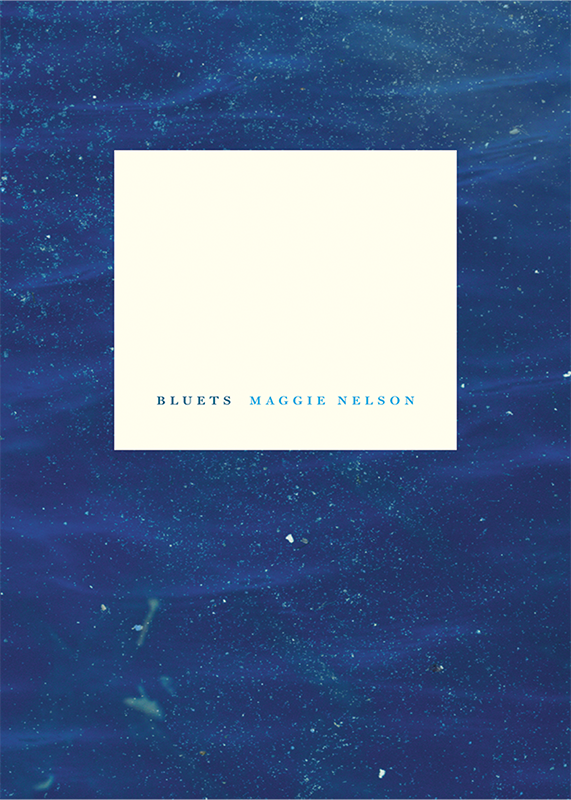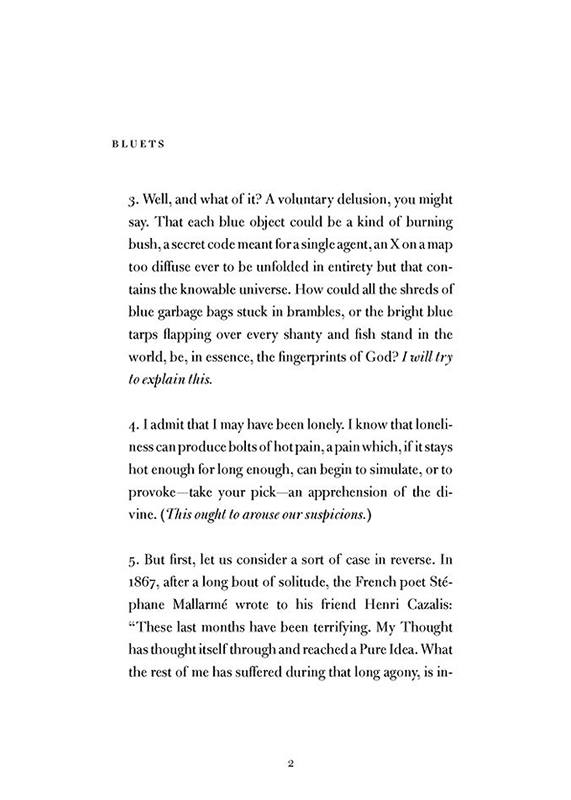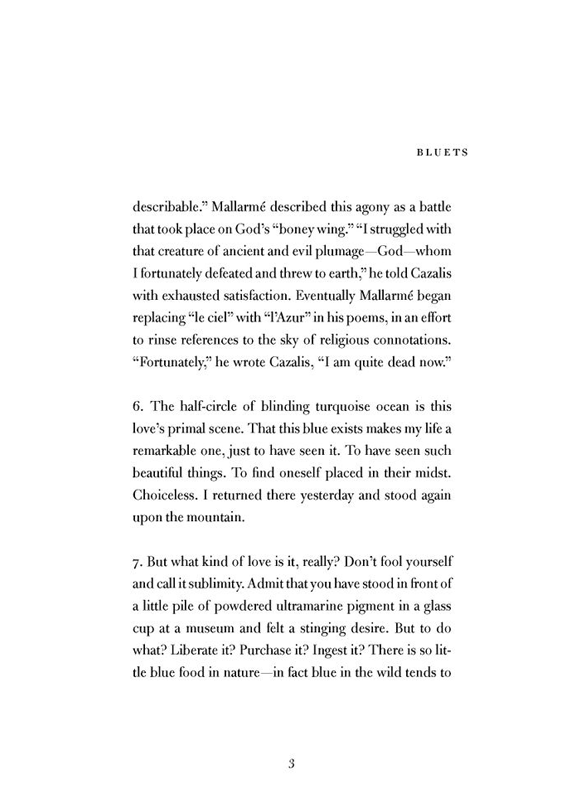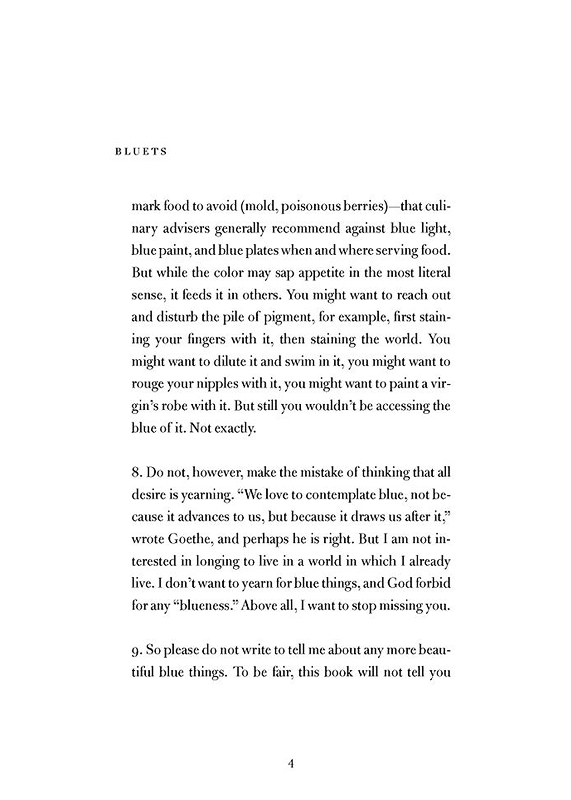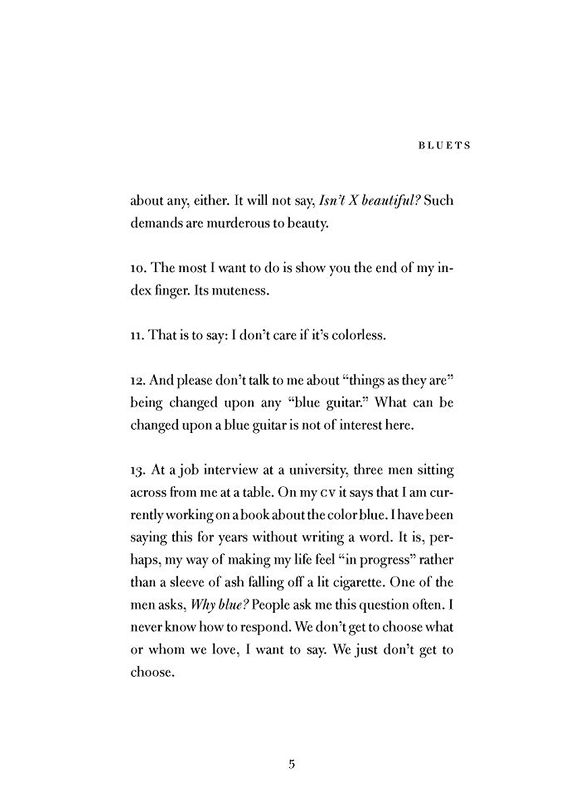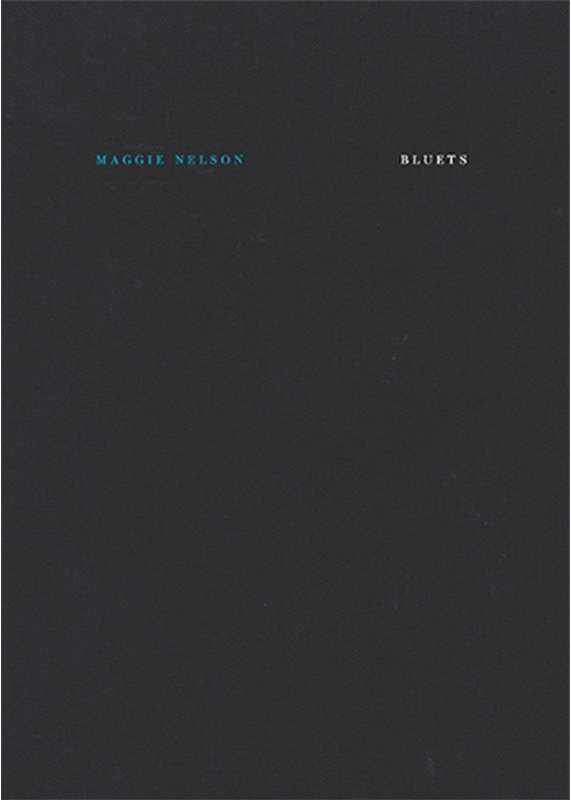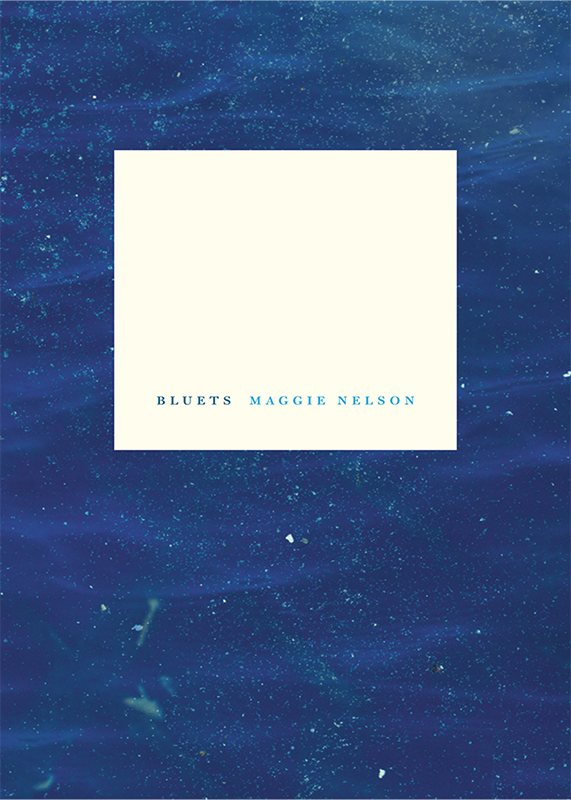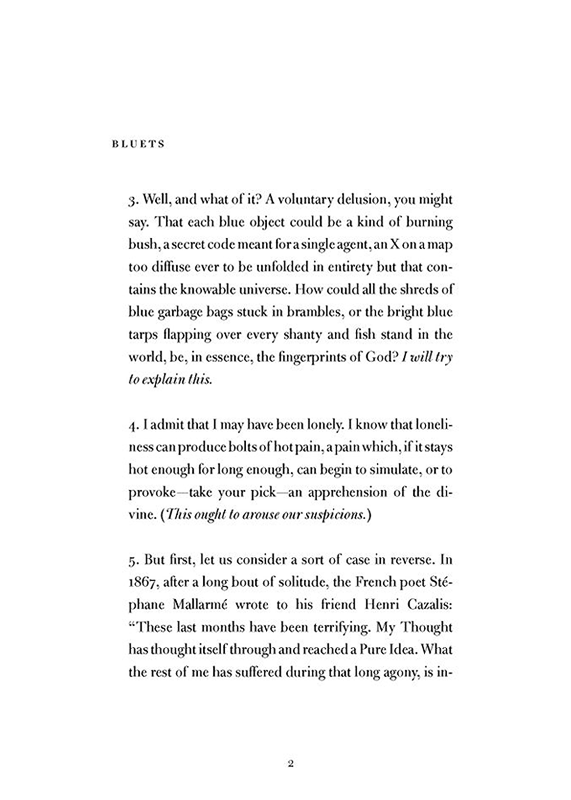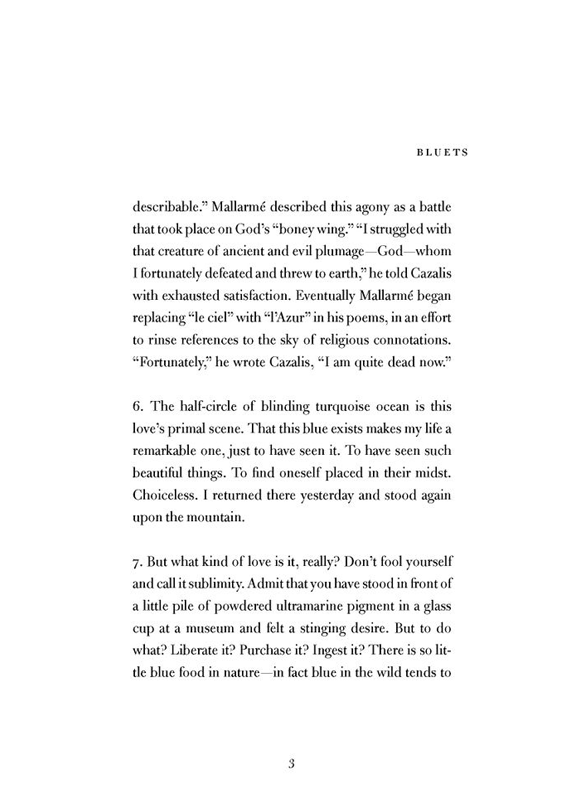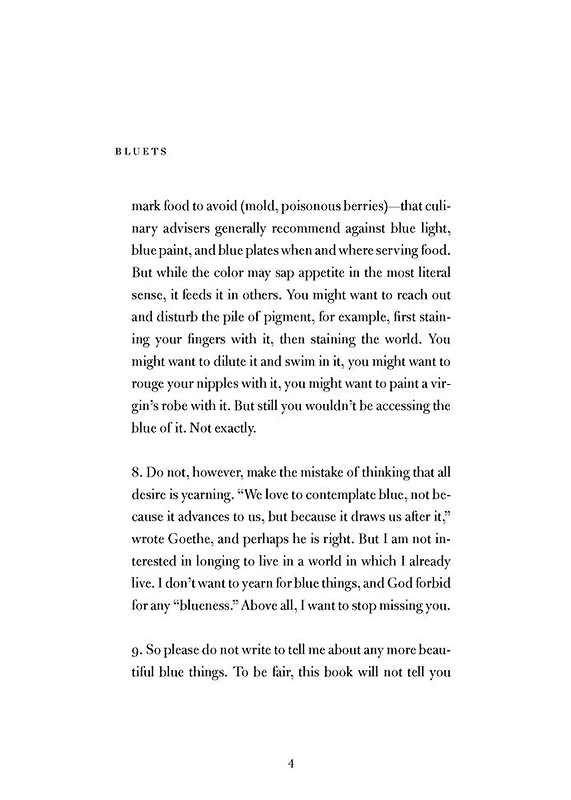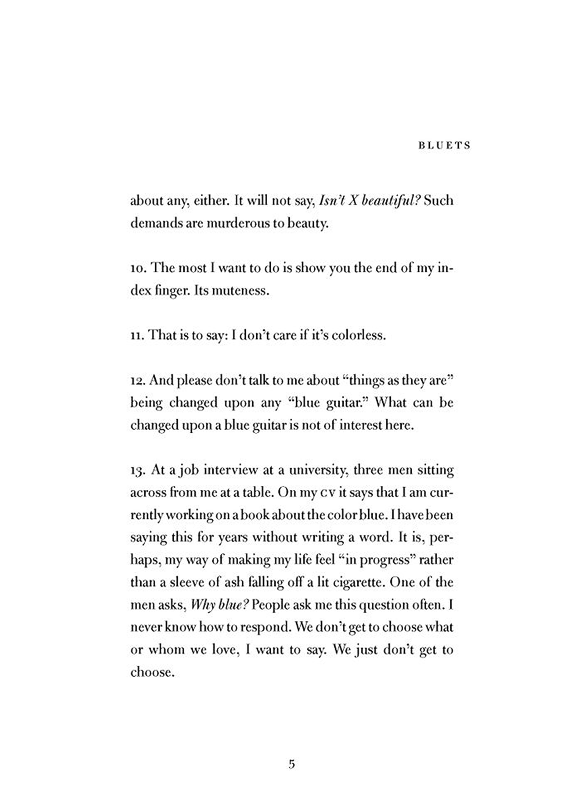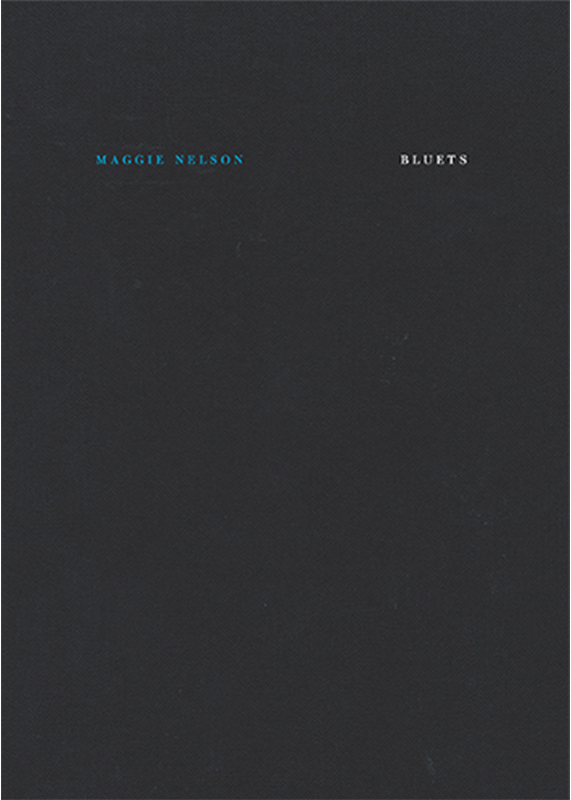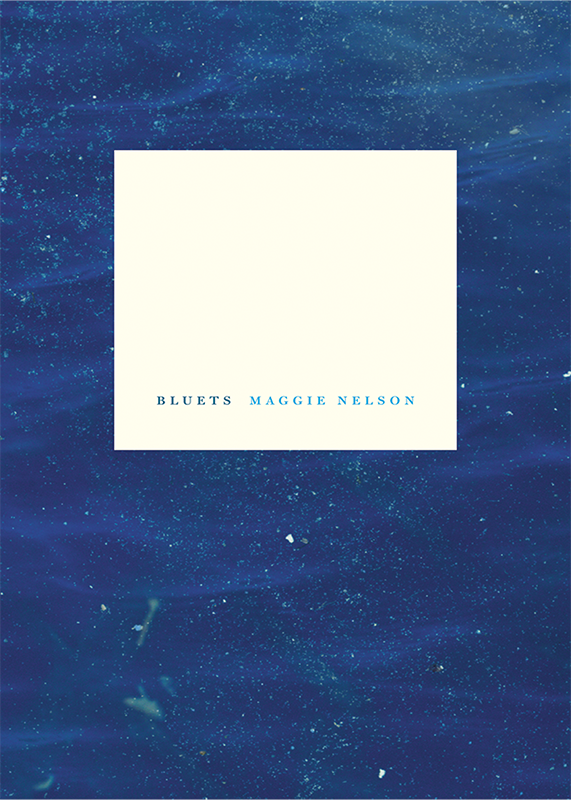
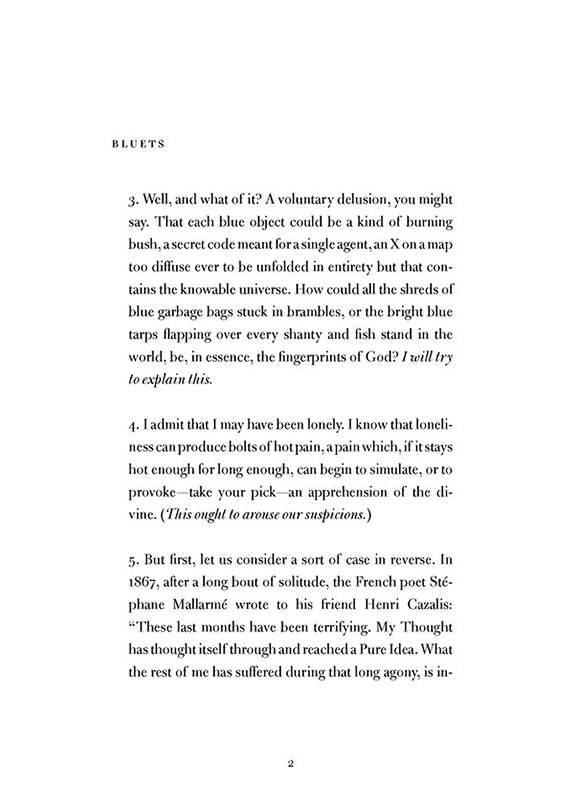
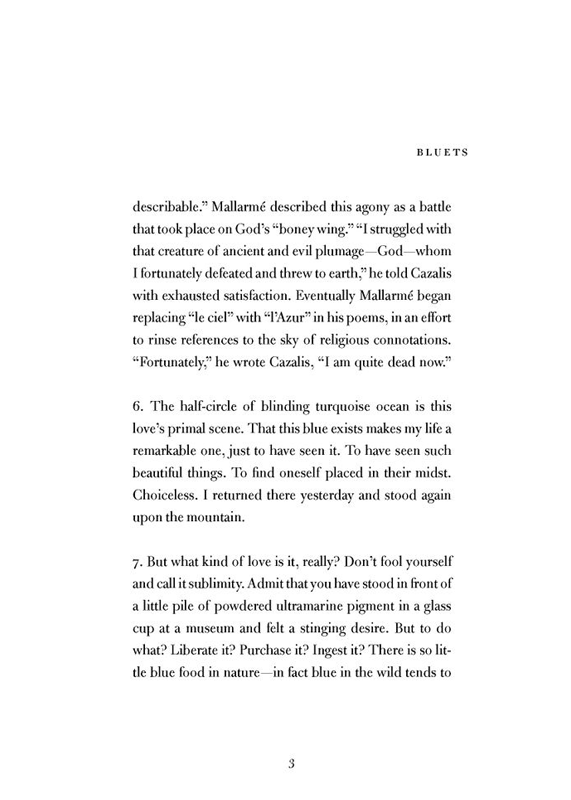
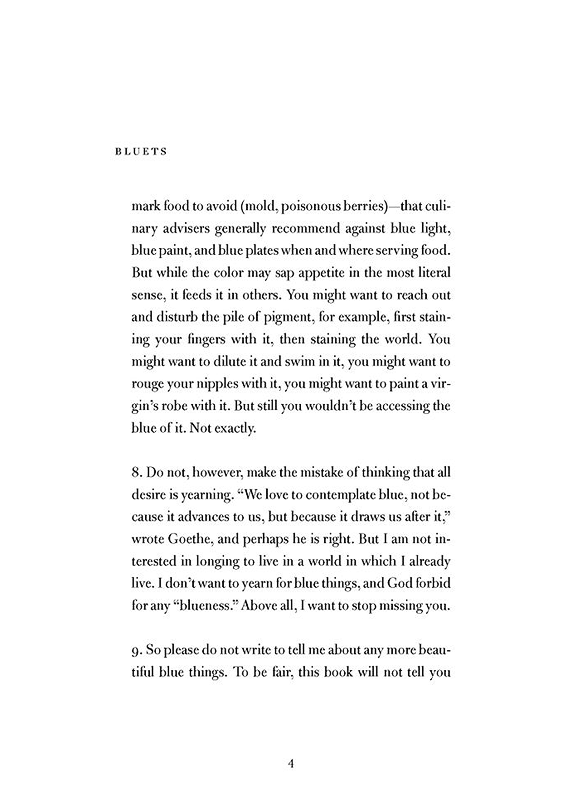
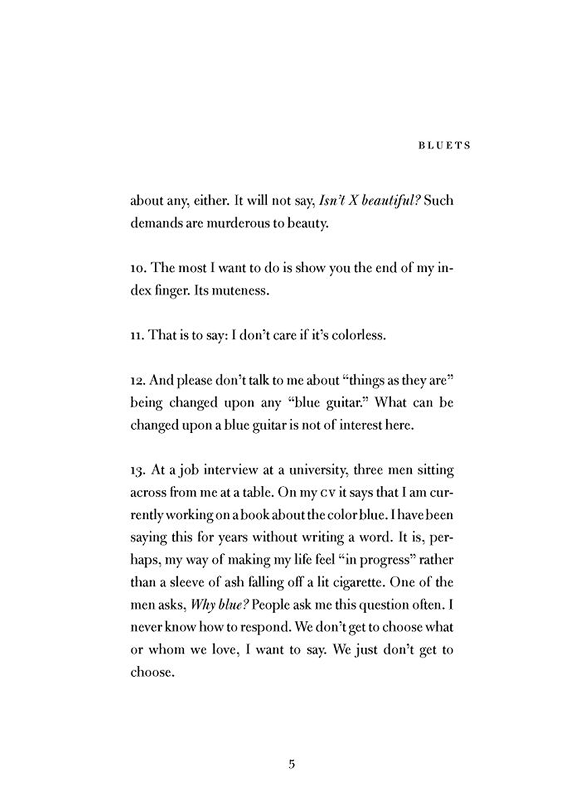
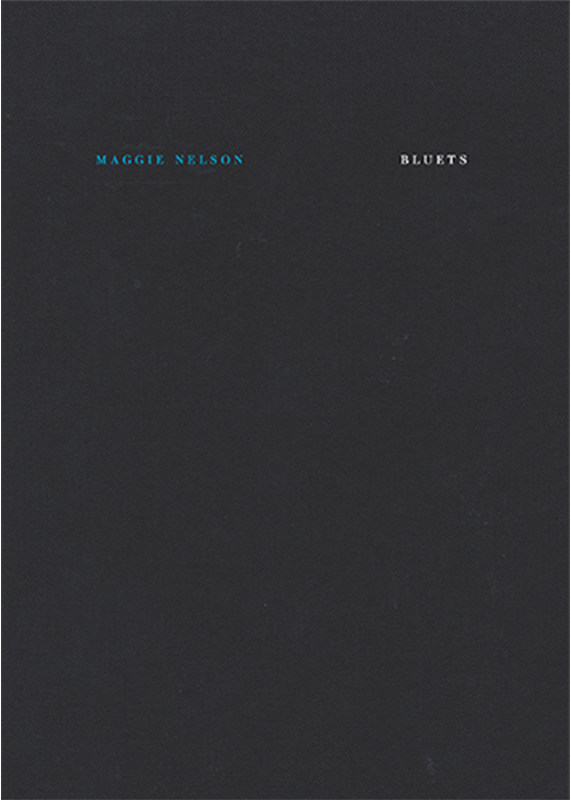
Bluets
Bluets
-
**2019 10TH ANNIVERSARY EDITION**
Named by Bookforum in 2015 as one of the top ten books
of the last 20 years.
Suppose I were to begin by saying that I had fallen in love with a color . . .
Since 2009, when it first published, to today, Bluets has drawn scores of readers with its surprising insights into the emotional depths that make us most human—via 240 short pieces, at once lyrical and philosophical, on the color blue. This beautiful hardcover edition celebrates Maggie Nelson’s uncompromising vision, inviting longtime fans and newcomers alike to experience and share in an indispensable work that continues to disrupt the literary landscape.
A lyrical, philosophical, and often explicit exploration of personal suffering and the limitations of vision and love, as refracted through the color blue, while folding in, and responding to, the divergent voices and preoccupations of such generative figures as Wittgenstein, Sei Shonagon, William Gass and Joan Mitchell. Bluets further confirms Maggie Nelson’s place within the pantheon of brilliant lyric essayists.
Published in over ten foreign editions, including Jonathan Cape, UK (2017), Kolektif Kitap, Turkey (2017), Editions Du Seuil, France (2017), Hanser Berlin, Germany (2017), Modernista, Sweden (2017), Saiplanet, Korea (2017), Editores Tajamar, Spain (2017); Pelikanen Forlag As, Norway (2018), No Kidding, Russia (2019), Schildts; Soderstrom, Finland (2019), Nottetempo, Italy (2023).
Adapted for the stage in 2024, by director Katie Mitchell, script adapted by Margaret Perry. Royal Court Theatre, London, England. Starring Emma D’Arcy, Kayla Meikle, and Ben Whishaw.
-
When Page comes out as gay and goes on his first public date, his partner gifts him a copy of Bluets by Maggie Nelson. "It's staggering, heart opening," Page wrote. "It was the perfect book to receive then and there." In her powerful collection of essays, Nelson uses the color blue to explore themes of suffering, love, and their limitations.
Katherine Esters on Elliot Page, The MessengerBalancing pathos with philosophy, she created a new kind of classicism, queer in content but elegant, almost cool in shape.
Hilton Als, The New Yorker
This set of meditations on the colour blue is full of wisdom and beauty.
The Guardian
Nelson's expressive style springs from her subject as much as the content, in turn, inflects her vocabulary, tone and structure. Seeking such reciprocity—no less an ideal than, say, “the spontaneous overflow of powerful feelings”—may radically redefine poetry, as it increasingly becomes the genre that is not one.
Albert Mobilio, Bookforum
Building the book as a collection of facts and quotations, Nelson interweaves her own insights, textual interpretations, and anecdotes ranging from the tragic to the outrageous. Nelson may, admittedly, have fallen short of the “compendium of blue observations, thoughts, and facts” she says she at first envisioned, but this slim volume is nonetheless an elegant, indispensable addition to the genre of the lyric essay.
Kathleen Rooney, Boston Review
From blue factoids like Benedict de Saussure’s 1789 invention of “cyanometer, with which he hoped to measure the blue of the sky,” to her own struggles with depression, Nelson gifts us with what seems like a lifetime study of blue while somehow slyly avoiding any of the obvious “blue” clichés. Maggie Nelson continues to raise the bar higher in what a reader can expect from a book. Bluets is smart yet intimate, quiet yet provocative, and a welcome addition to the poetic non-fiction discourse.
Susie DeFord, BOMB
In the end Nelson breaks free of romance’s tyranny. She dreams someone sends her cornflowers, the American name for bluets. Shaggy, wild, and strong—they’re a revealing metaphor for the author.
Jeffrey Cyphers Wright, The Brooklyn Rail
In 240 entries, Nelson relates a history of blue from philosophical, zoological and literary perspectives, all the while weaving in bits of memoir and emotional rumination. Through this collage, she broadens the definition of blue from a merely visual phenomenon to a vehicle for the divine.
Catherine Lacey, Time Out New York
It’s an impossible book to describe without simply handing it to you; it is, hackneyed as it is to say, a book to be experienced. I can only report that I am reading it again and again, that the resonances between the (seemingly) disparate propositions are startling and emotional, that I suspect your reaction will be different and also quite wonderful.
Peter Rock, The Rumpus
Brash, feverish, intractable, exploratory, and terribly “touchant” Nelson’s Bluets is, I am remind’d for some reason (it’s in Marías) of Rimbaud’s line: “Par délicatesse / J’ai perdu ma vie.”
John Latta, Isola di Rifuti
In the 240 prose entries the book consists of, Nelson deals with the personal loss of a relationship and witnesses the physical suffering of a friend who became a quadriplegic following an accident (something Nelson also wrote about in her 2007 poetry collection, Something Bright, Then Holes), all while returning again and again to the color blue.
Gina Myers, Bookslut
Nelson doesn’t want to leave anything out, as suits a collector’s project. Thus, in the same way that she wanders among blue objects (shards of glass, bottles of ink, stones and tattoos and the nests of bowerbirds) and accidental theorists of color (Goethe and Newton and Duras and Novalis) and the color’s utility in human imagination (blue moods, blues music, the blue divine), she likewise wanders among the positions the orchestrator of these lists must adopt. This results in an admixture of candor, passion and detachment that makes for irresistible intimacy.
Ray McDaniel, The Constant Critic
It must be said upfront that Maggie Nelson could have worked this out as a book of poetry if that’s what she had wanted to do early on. Which is to say, for a book that might actually be an essay, which might be a lyrical essay, for a long work that “blurs genre,” she fills the requirement of what good poetry must do, which is deliver new ways of talking and looking and thinking, and helping us to look and think.
Ben Fama, Fanzine
The book is a philosophical and personal exploration of what the color blue has done to Nelson. Despite the exhaustion, Bluets wears its hybrid/fragmented dress well, showing its seams and much enthralled by its wanderlust, an aesthetic runway that constantly leads Nelson to find new ideas, images, and expressions.
Thomas Larson, TriQuarterly
Bluets reaches far beyond the constraints of its subject, resulting in a series of delicately associative numbered paragraphs investigating a broken romantic relationship, a friend’s chronic nerve pain, the writing process itself, and the deceptive elements of perception and color. The result not only defies easy categorization, but also leans toward Walter Benjamin’s famous declaration that all great works of literature either dissolve a genre or invent one.
Rob Schlegel, Jacket
Incandescent prose with a structural flow unlike anything I’ve ever read. A book beyond genre that deals with deep topics playfully, offering revelatory insights on every page. I read this book on an airplane and I will never be the same.
Chad Murphy, Document
Publication Dates:
10th Anniversary Hardcover: September 3, 2019
Paperback: October 1, 2009
ISBN# 9781933517407 (5x8 112pp, paperback)
ISBN# 9781940696904 (5x8 112pp, hardcover)
Couldn't load pickup availability
